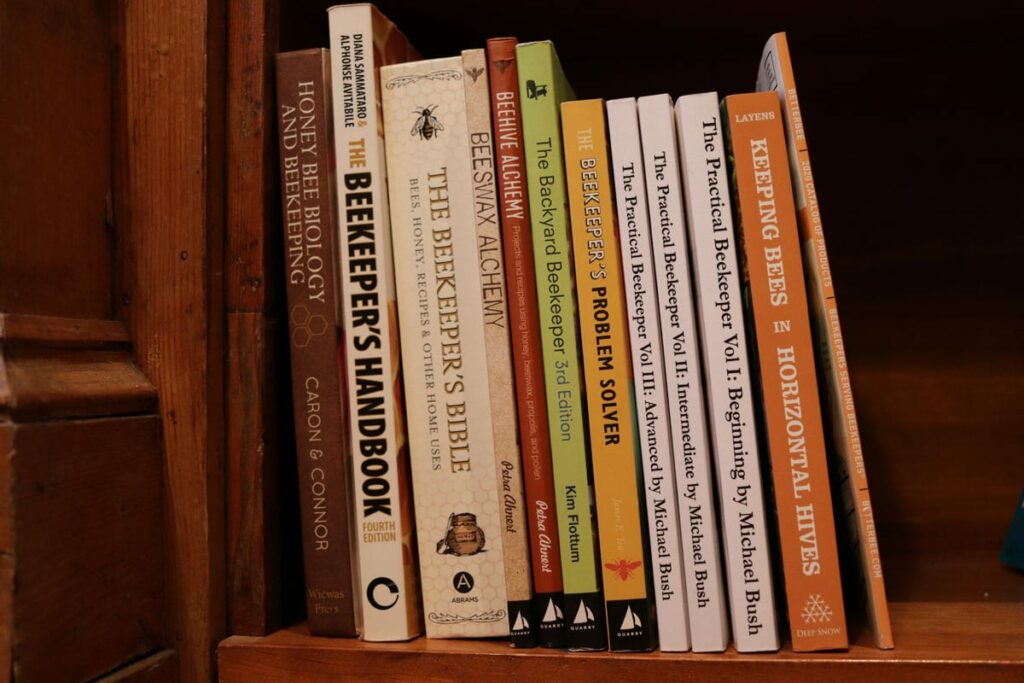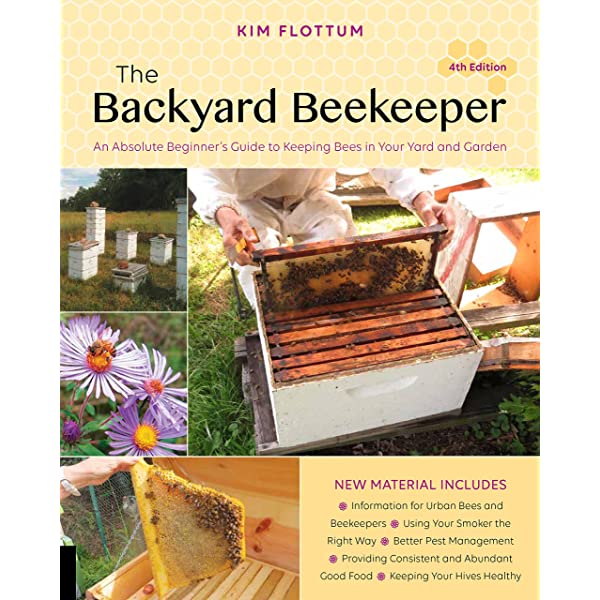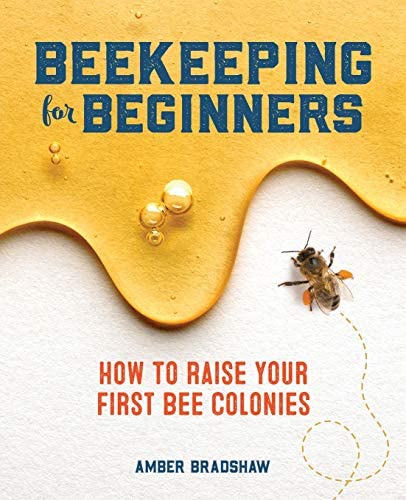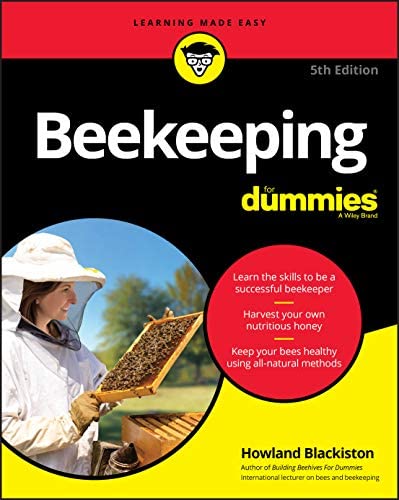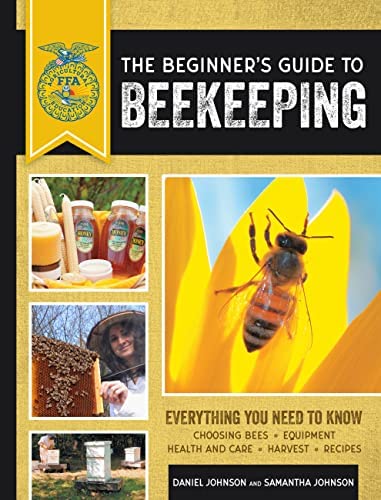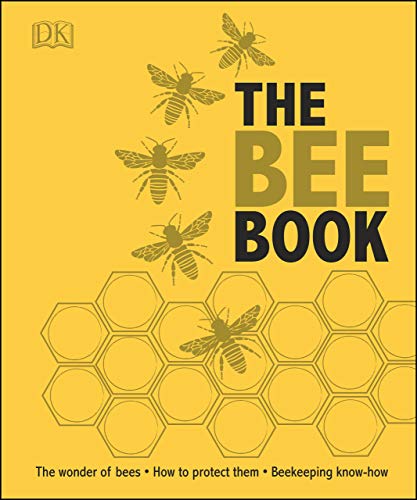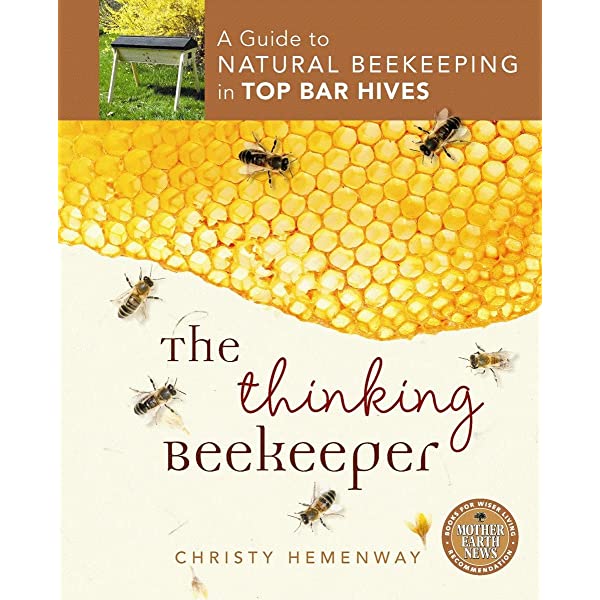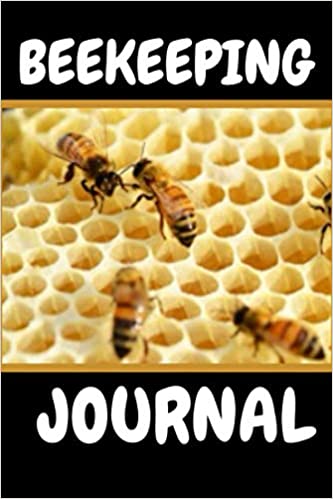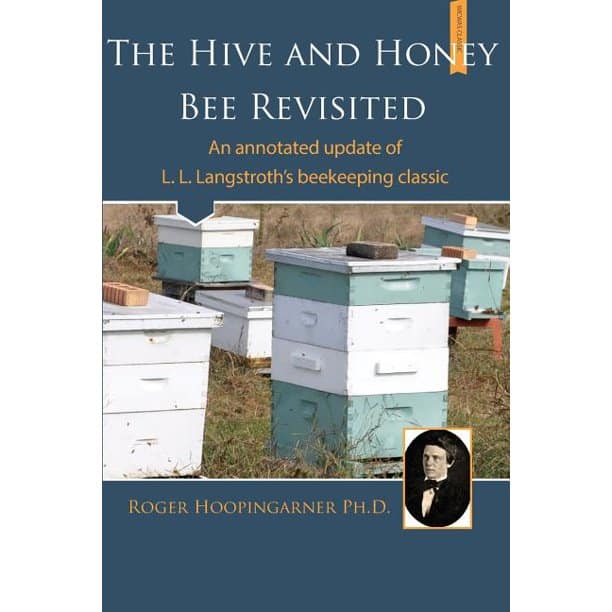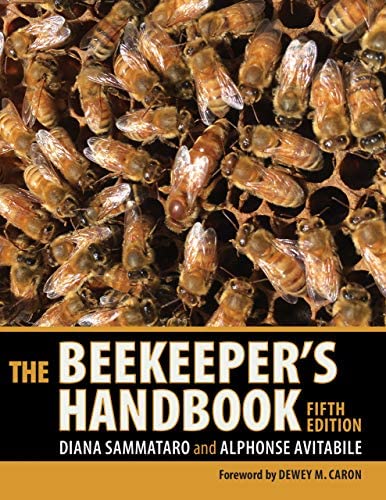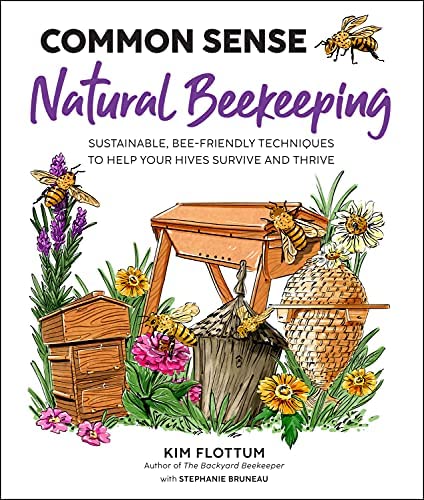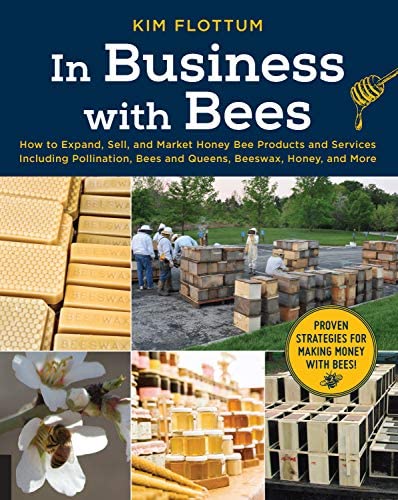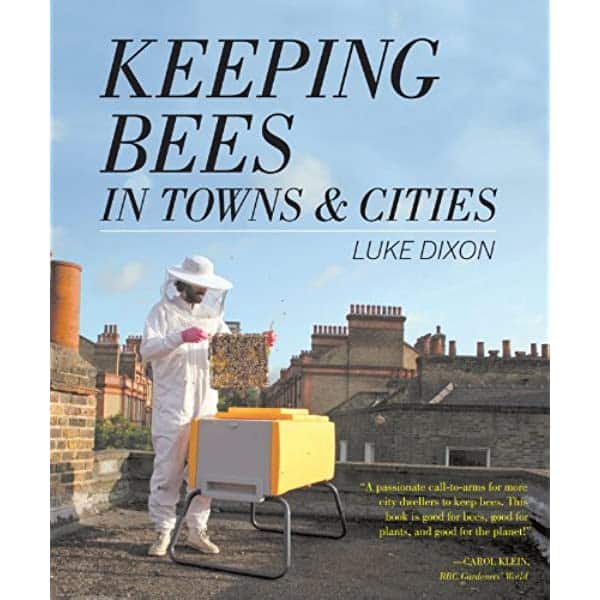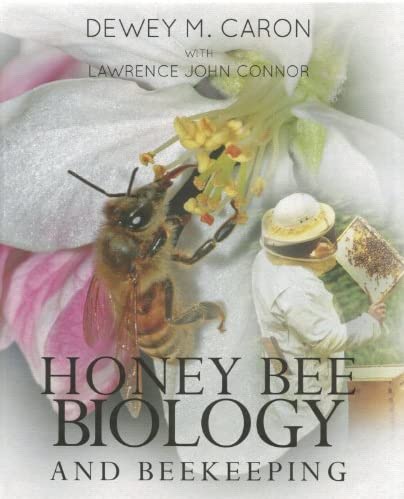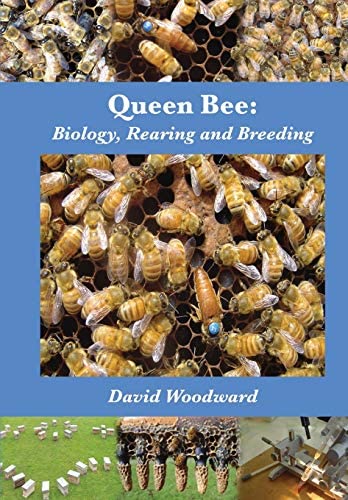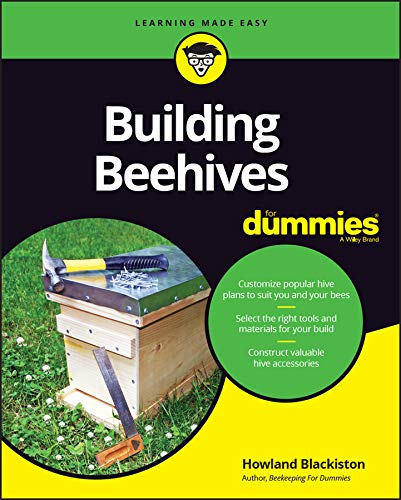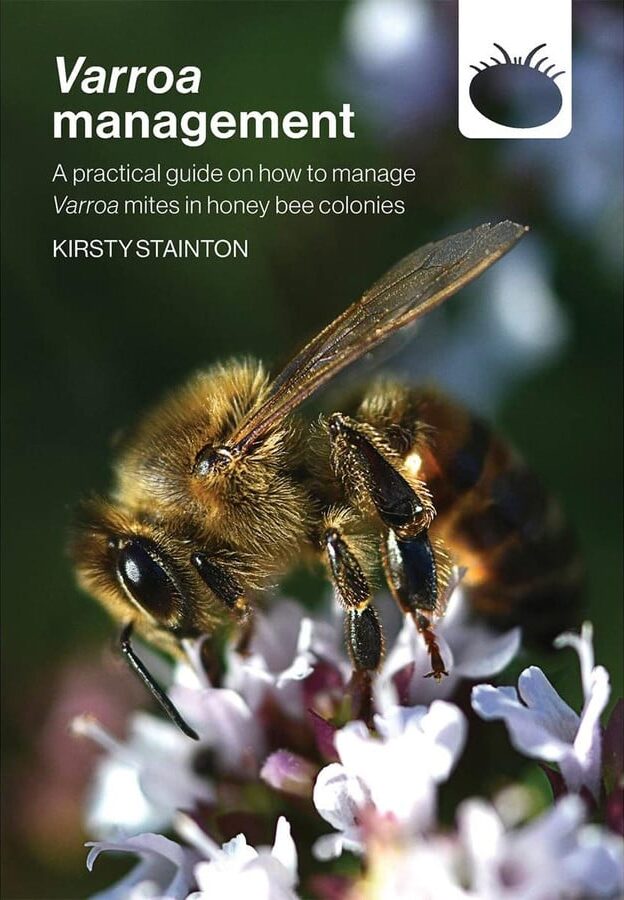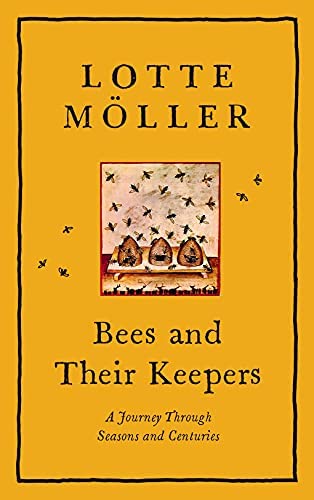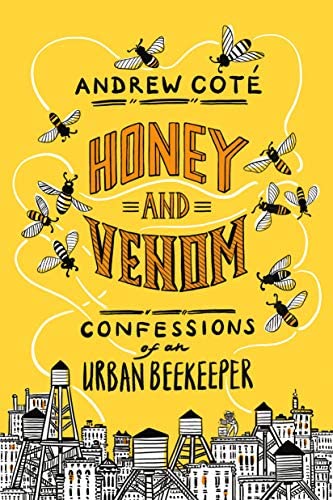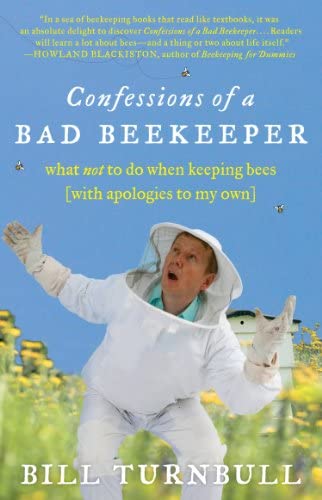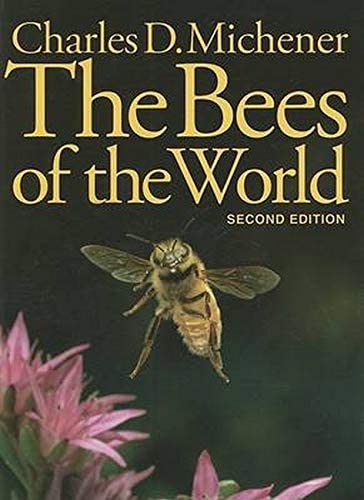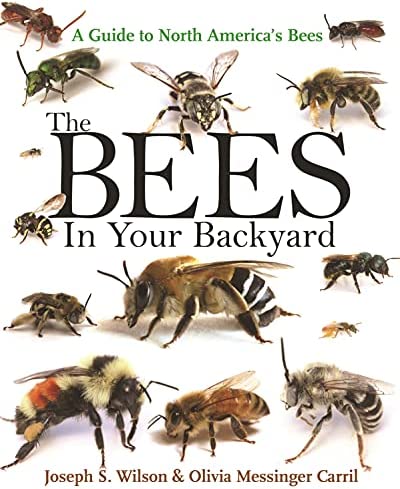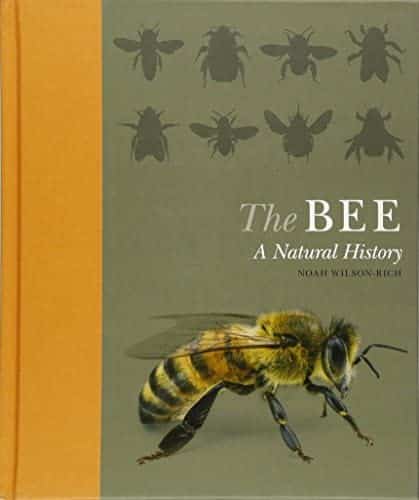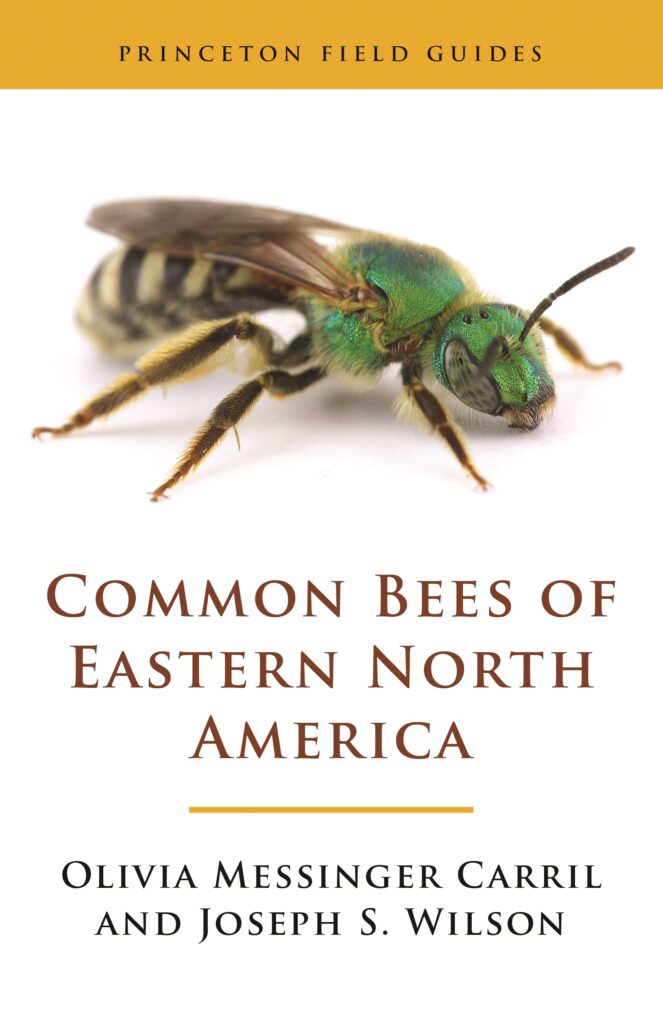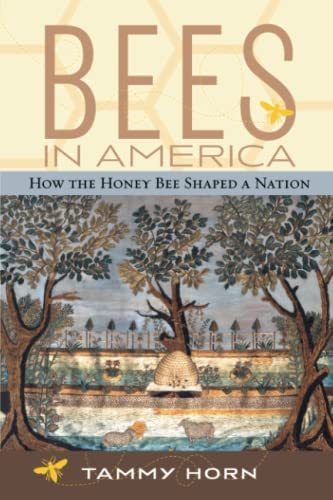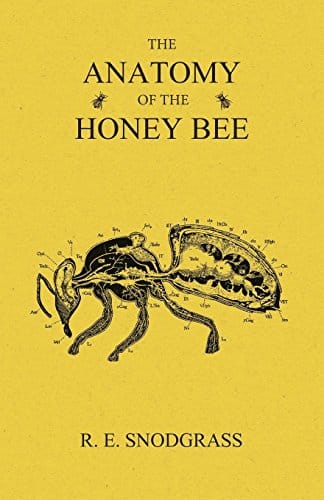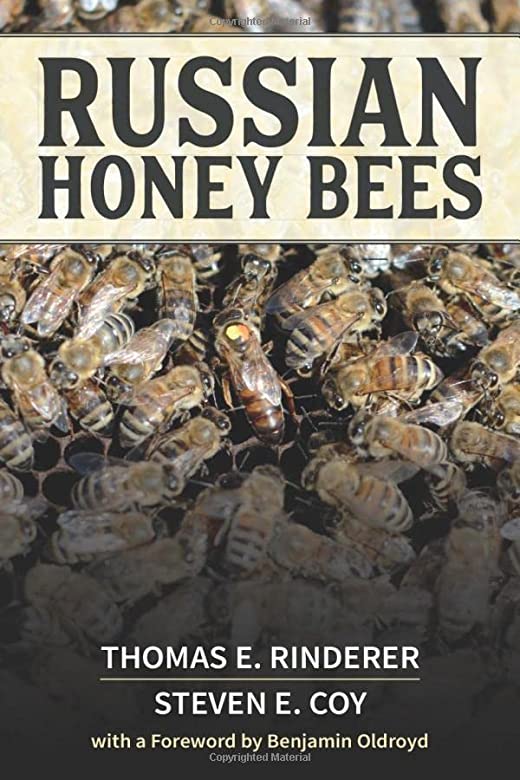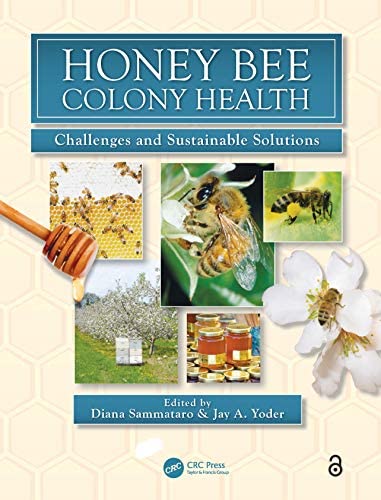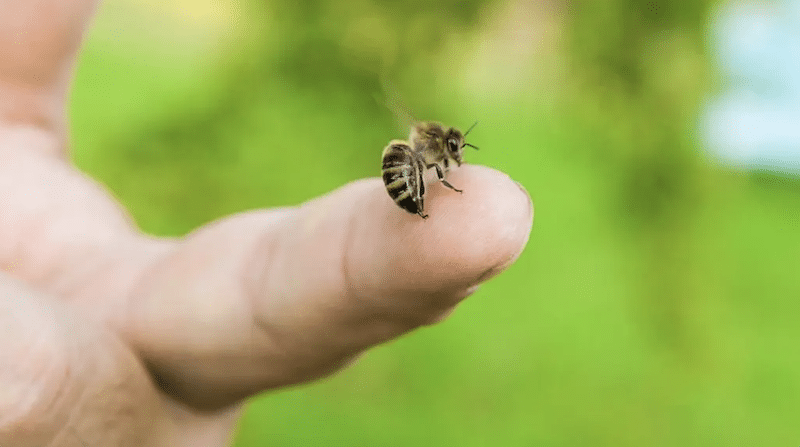Contents:
- Introduction to Beekeeping Books
- Beekeeping Advice for Experienced Beekeepers
- Books About Beekeepers
- Informative Books About Bees and Their History
Are you thinking about taking up beekeeping this year, or are you an experienced beekeeper looking to learn more about bees and improve your beekeeping skills? Whatever your experience level, we’ve put together a selection of the 26 best beekeeping books that includes introductory books on beekeeping, advice for experienced beekeepers, books about beekeepers, and informative books about bees and their history.
–– Interested to know how the bees are doing? Download our State of the Honey Bee Report now ––
If you’re looking for the perfect present for a friend or relative who’s into beekeeping, you’re sure to find the perfect choices for them here!
Introduction to Beekeeping
1. The Backyard Beekeeper: An Absolute Beginner’s Guide to Keeping Bees in Your Yard and Garden – Kim Flottum , Quarry Books 2014
“More than a guide to beekeeping, it is a handbook for harvesting the products of a beehive and a honey cookbook–all in one lively, beautifully illustrated reference. This complete honey bee resource contains general information on bees; a how-to guide to the art of beekeeping and how to set up, care for, and harvest honey from your own colonies; as well as tons of bee-related facts and projects.” – Amazon
2. Beekeeping for Beginners: How To Raise Your First Bee Colonies – Amber Bradshaw, Rockridge Press 2019
“Beekeeping for Beginners is a simple, step-by-step guide that helps you learn the fundamentals of modern beekeeping. You (and your bees) will be buzzing with delight. From picking the right hive and bringing your bees home to surviving winter and collecting honey, experienced beekeeper Amber Bradshaw takes you on an easy-to-follow journey through your first year of beekeeping and beyond.” – Amazon
“Finally – a beekeeping book that’s truly for beginners. Amber walks the reader through all the basics of beekeeping with patience, a sense of humor, and honesty – including information many books skip. Well done.” – Laurie Neverman, Common Sense Home
- Recommended by David Hansen, Best Bees Beekeeper
3. Beekeeping for Dummies – Howland Blackiston, For Dummies 2020
“Including the latest information regarding every aspect of backyard beekeeping and honey production, this book describes how to get started, how to care for and safely handle bees, and how to maintain healthy and productive colonies. This book is loaded with up-to-date, practical examples and helpful illustrations of proven techniques and strategies for both new and seasoned hobbyist beekeepers.” – Amazon
4. The Beginner’s Guide to Beekeeping: Everything You Need to Know – Daniel Johnson and Samantha Johnson, Voyageur Press 2109
“Beginning with the basics, seasoned beekeepers Daniel and Samantha Johnson answer all of a prospective beekeeper’s questions on how to set up, care for, and harvest their very own bee colonies. With the help of this comprehensive DIY guide, raising bees can be an enjoyable and accessible backyard pastime for gardeners, crafters, and cooks everywhere.” – Amazon
5. The Bee Book: Discover the Wonder of Bees and How to Protect Them for Generations to Come – Alistair Daing, Editor, DK 2016
“The Bee Book shows you step-by-step how to create a bee-friendly garden, get started in beekeeping, and harness the power of honey for well-being. Fully illustrated with full-color photographs throughout, this beautiful guide covers everything you need to know to start your own backyard hive, from setup to harvest. Practical beekeeping techniques are explained with clear step-by-step sequences, photos, and diagrams so you’ll be prepared to establish your own colony, deal with diseases, collect a swarm, and much more.” – Amazon
“Budding entomologists, young environmentalists, and gardening enthusiasts alike are bound to discover fascinating facts and how-to project inspiration.” – School Library Journal
6. The Thinking Beekeeper: A Guide to Natural Beekeeping in Top Bar Hives – Christy Hemenway, New Society Publishers 2013
“The Thinking Beekeeper is the definitive do-it-yourself guide to natural beekeeping in top bar hives. Based on the concept of understanding and working with bees’ natural systems as opposed to trying to subvert them…” – Amazon
“The Thinking Beekeeper is a unique and exceptional resource for the beginning beekeeper. It will enable the novice to make a successful start in the craft and as he/she progresses all those instructions offer the opportunity to object to something Christy recommends. And that ladies and gentlemen is the badge of an independent practitioner and mature thinking beekeeper.” – Marty Hardison
7. Beekeeping Journal and log book: Beekeepers Honey Bee Record Keeping Notebook, Beehive Inspection Log Book Gift to Keep Track Of Your Hives In All Weather Conditions – Arit Anderson, independently published 2021
“An easy-to-carry beekeeping inspection journal created to allow you to track the health of your beehives and all aspects of your beekeeping activities. Perfect to be part of your beekeeping starter kit.” – Amazon
Beekeeping Advice for Experienced Beekeepers
8. The Hive and the Honey Bee Revisited: An Annotated Update of Langstroth’s Classic – Roger Hoopingarner, Wicwas Press, 2014
“More than 150 years after L.L. Langstroth invented the movable-comb hive and brought beekeeping into the modern age, we can still learn from this historic book. The original book, preserved in its original text and illustrations, is updated and annotated by one of the foremost researchers in apiculture, Dr. Roger Hoopingarner. This book keeps alive, for future generations, beekeeping techniques from the past and offers many lessons for modern beekeepers.” – Amazon
- Recommended by Nate Reid, Best Bees Head Beekeeper
9. The Beekeepers Handbook – Diana Sammataro and Alphonse Avitabile, Comstock Publishing Associates 2021
“Diana Sammataro and Alphonse Avitabile have created the best single-volume guide to the hobby and profession of beekeeping. The Beekeeper’s Handbook provides step-by-step instructions for setting up an apiary, handling bees, and working throughout the season to maintain a healthy colony and a generous.” supply of honey. Various colony care options and techniques are explained so that beekeepers can make the best choices for their hives.” – Amazon
“Since the publication of the first edition of the handbook in 1973, many thousands of novice and experienced beekeepers have relied on this book as the preferred single-volume guide to bee keeping.” – British Journal of Entomology and Natural History
- Recommended by Noah Wilson-Rich, Best Bees Founder and Chief Science Officer
10. Common Sense Natural Beekeeping: Sustainable, Bee-Friendly Techniques to Help Your Hives Survive and Thrive – Kim Flottum, Quarry Books 2021
“Chemical treatments for pests like the ubiquitous and deadly varroa mite have become standard even as resistance to such treatments grows and evidence suggests the chemical treatments themselves are contributing to the widely discussed Colony Collapse Disorder. Common Sense Natural Beekeeping offers beekeepers a different choice. Based on expert advice from Kim Flottom, editor emeritus of Bee Culture magazine and best-selling author of The Backyard Beekeeper, this book teaches holistic, sensible alternatives to conventional apiary practices…” – Amazon
11. In Business with Bees: How to Expand, Sell, and Market Honeybee Products and Services Including Pollination, Bees and Queens, Beeswax, Honey, and More – Kim Flottum, Quarry Books 2018
“This book takes serious beekeepers past the beginning stages and learning curves and offers practical, useful advice to move your passion into a part-time or full-time career with measurable results. This beekeeping business how-to guide offers all of the in-depth advice you need, in one place.” – Amazon
12. Keeping Bees in Towns and Cities – Luke Dixon, Timber Press 2012
“Keeping Bees in Towns and Cities features everything an urbanite needs to know to start keeping bees: how to select the perfect hive, how to buy bees, how to care for a colony, how to harvest honey, and what to do in the winter. Urban beekeeping has particular challenges and needs, and this book highlights the challenges and presents practices that are safe, legal, and neighbor-friendly.” – Amazon
“Dixon shares his compelling account that describes how urban bees enjoy excellent health, help pollinate plants, produce rich and plentiful honey, and make for a rewarding hobby.” – Mother Earth News
13. Honey Bee Biology and Beekeeping, Revised – Dewey Caron and Lawrence Connor, Wicwas Press 2013
“The standard beekeeping (apiculture) textbook used to teach college students and beekeepers the science and practice of bees and beekeeping. It concentrates on the ‘why’,’how’ and ‘when’ of beekeeping. It explains bee basics in a manner meaningful to people who lack an intensive background in biology. It does not oversimplify, and provides a meaningful source of beekeeping information for the new and informed beekeeper.” – Amazon
- Recommended by Noah Wilson-Rich, Best Bees Founder and Chief Science Officer
14. Queen Bee: Biology, Rearing and Breeding – David Woodward, Northern Bee Books 2014
“Divided into three major chapters with many sub-sections, this book is a definitive guide to the biology and breeding of queen bees. Chapter one covers queen bee biology, chapter two looks at queen bee rearing, and chapter three covers queen bee breeding.” – Amazon
- Recommended by David Hansen, Best Bees Beekeeper
15. Building Beehives For Dummies – Howland Blakiston, For Dummies 2019
“Building Beehives For Dummies is the follow-up book to the bestselling Beekeeping For Dummies. It provides everything you need to learn how to build some of the world’s most popular hives and beekeeping accessories. For each design the book includes a detailed materials list (what lumber, hardware and fasteners you’ll need), step-by-step building instructions, and illustrative drawings that show how the components all fit together.” – Amazon
16. Varroa Management — Kirsty Stainton
This guidebook is a must-have for anyone looking to effectively treat Varroa mites. It contains all the information you need for successfully managing these pests in your bee colonies.
In this essential user-guide you will learn:
- Why Varroa mites are such a serious pest of honeybees.
- How to spot signs that a honeybee colony is carrying a high mite burden.
- How to perform regular monitoring for Varroa mites.
- How to choose the correct treatment for the time of year and colony conditions.
- The precise methods for applying any treatment on the market, including specific methods for treating nucs.
- How to use husbandry techniques to manage mites without the need for chemicals, with step-by-step guides.
Books about Beekeepers
17. Bees & Their Keepers: A Journey Through Seasons and Centuries – Lotte Möller, Harry N. Abrams 2021
“In this compelling cultural history that moves beautifully through the beekeeper’s year, Swedish beekeeper and writer Lotte Möller shares her understanding of bees and bee lore from antiquity to the present with deep knowledge and sharp wit. Möller gives insight into the activity in the hive and describes the bees’ natural order and habits. She explores the myths of the past, and how and when they were replaced by fact. In stories from her travels, Möller encounters a host of colorful characters, from a trigger-happy California beekeeper raging against both killer bees and bee politics, to the legendary Brother Adam of Buckfast Abbey, breeder of the Buckfast Queen, now popular around the world.” – Amazon
18. Honey and Venom: Confessions of an Urban Beekeeper – Andrew Cote, Ballantine Books 2020
“A year in the life of New York City’s premier beekeeper, who chronicles his adventures and the quirky personalities he encounters while spreading his infinite knowledge of and passion for the remarkable honey bee.” – Amazon
“[Coté’s] journey to urban beekeeping is brought to life as he recounts often funny or bizarre situations . . . [an] informative and entertaining memoir.” – The New York Times Book Review
19. Confessions of a Bad Beekeeper: What Not to Do When Keeping Bees – Bill Turnbull, XXX
“Confessions of a Bad Beekeeper chronicles Turnbull’s misadventures (and brief moments of triumph) in the curious world of backyard beekeeping–and also highlights both the threat to our bee population and what we can do to help these vital little creatures do their wonderful work.” – Amazon
“Turnbull, the longtime cohost of England’s answer to The Today Show, takes up beekeeping on a whim and brings us along on his apiarian adventures. His genial and comedic tone will deliver readers through technical jargon and beekeeping history. The book’s real appeal will be to those who already think backyard bees are a honey—excuse the pun—of an idea and who will comb the book for the myriad details of use to other amateur beekeepers.” – Library Journal
Informative Books about Bees
20. The Bees of the World – Charles Michener, Johns Hopkins University Press 2017
“In this extensive update of his definitive reference, Charles D. Michener reveals a diverse fauna that numbers more than 17,000 species and ranges from the common honeybee to rare bees that feed on the pollen of a single type of plant. With many new facts, reclassifications, and revisions, the second edition of The Bees of the World provides the most comprehensive treatment of the 1,200 genera and subgenera of the Apiformes. Included are hundreds of updated citations to work published since the appearance of the first edition and a new set of plates of fossil bees.” – Amazon
“Magnificent book . . . Should appeal not only to entomologists interested in bees, but also to ecologists looking for an overview of bee biology.” – Nature
21. The Bees in Your Backyard: A Guide to North America’s Bees – Joseph Wilson and Olivia Messinger Carrill, Princeton University Press 2015
“The Bees in Your Backyard provides an engaging introduction to the roughly 4,000 different bee species found in the United States and Canada, dispelling common myths about bees while offering essential tips for telling them apart in the field. The book features more than 900 stunning color photos of the bees living all around us―in our gardens and parks, along nature trails, and in the wild spaces between. It describes their natural history, including where they live, how they gather food, their role as pollinators, and even how to attract them to your own backyard.” – Amazon
Winner of the 2017 PROSE Award in Single Volume Reference/Science, Association of American Publisher
22. The Bee: A Natural History – Noah Wilson-Rich, Princeton University Press 2018
“This book provides an unmatched account of this astounding diversity, blending an engaging narrative with practical, hands-on discussions of such topics as beekeeping and bee health. It explores our relationship with the bee over evolutionary time, examining how it originated and where it stands today―and what the future holds for humanity and bees alike.” – Amazon
“By contrasting the biologies and behaviours of some of the solitary bees, stingless bees, masons, carpenters and bumbles, the author presents an interesting and readable handbook on this insect icon and its wild relatives.” – Richard Jones, BBC Wildlife
23. Common Bees of Eastern North America – Olivia Carral and Joseph Wilson, Princeton University Press 2021
“Common Bees of Eastern North America is the first species-level photographic field guide to the most commonly seen bees in the eastern United States and Canada. Identifying bees to species is challenging even for taxonomists. This book walks you through the process of bee identification using breathtaking high-resolution color photos that highlight the unique characteristics of each species, making identification easier.” – Amazon
Winner of the Nature Guidebook Award, National Outdoor Book Awards
24. Bees in America – Tammy Horn, The University Press of Kentucky 2006
“Bees in America is an enlightening cultural history of bees and beekeeping in the United States. Tammy Horn, herself a beekeeper, offers a social and technological history from the colonial period, when the British first brought bees to the New World, to the present, when bees are being trained by the American military to detect bombs. Horn shows how the honey bee was one of the first symbols of colonization and how bees’ societal structures shaped our ideals about work, family, community, and leisure.” – Amazon
“Integrates history, technology, sociology, economics, and politics with this remarkable insect serving as the unifying concept.” – Buffalo News
25. The Anatomy of the Honey Bee – R.E. Snodgrass, Home Farm Books, 2016 (a reprint of the 1910 Classic)
“’The Anatomy of the Honey Bee’ is a vintage treatise first published in 1910. It deals in detail with the physiognomy, anatomy, and natural history of the honey bee, making it ideal for those with a serious interest in bees and bee-keeping.” – Amazon
26. Russian Honey Bees – Thomas Rinderer & Steven Coy, independently published 2020
“Russian honey bees are a stock of honey bees that were bred to be resistant to Varroa mites and have good beekeeping functionality for both honey production and pollination. This book describes the project to produce the Russian honey bee stock, conducted over 20 years of work by the combined efforts of scientists and beekeepers. Practical information on the management of Russian honey bees is combined with understandable summaries of the extensive scientific literature on Russian honey bees from a variety of scientific journals.” – Amazon
27. Honey Bee Colony Health: Challenges and Sustainable Solutions – Diana Sammataro, CRC Press 2011
“This book summarizes the current progress of bee researchers investigating the status of honey bees and possible reasons for their decline, providing a basis for establishing management methods that maintain colony health. Integrating discussion of Colony Collapse Disorder, the chapters provide information on the new microsporidian Nosema ceranae pathogens, the current status of the parasitic bee mites, updates on bee viruses, and the effects these problems are having on our important bee pollinators.” – Amazon
“I am not going to say that this book should be on every beekeeper’s book shelf; that is the wrong place for it. It should be much nearer at hand and thoroughly studied. With beekeepers commonly accepting 30% losses, they need to know what is going on and what is being done to help them and their bees.” – John Phipps, The Beekeepers Quarterly


